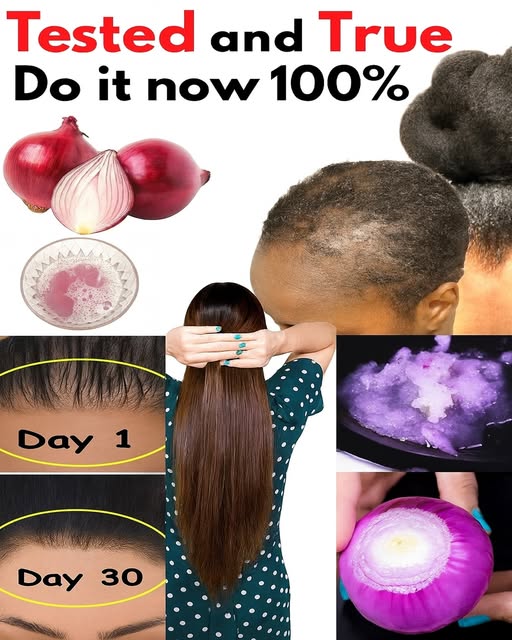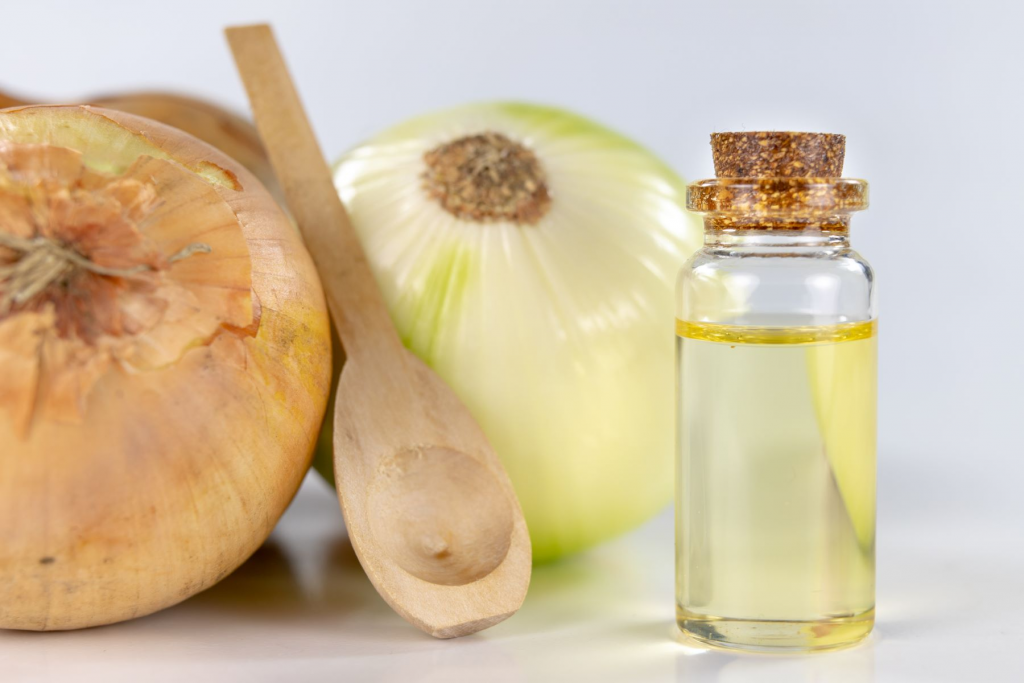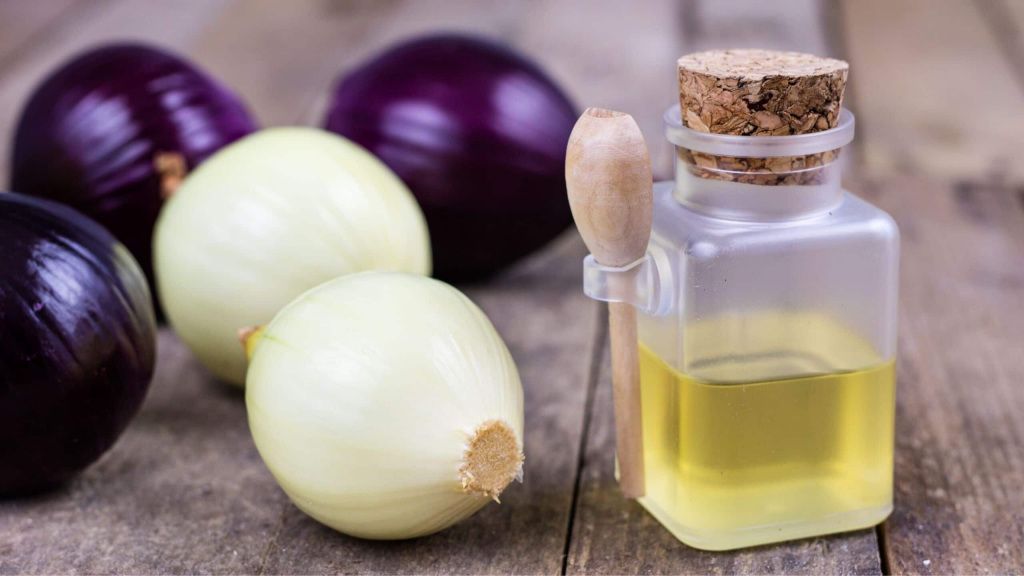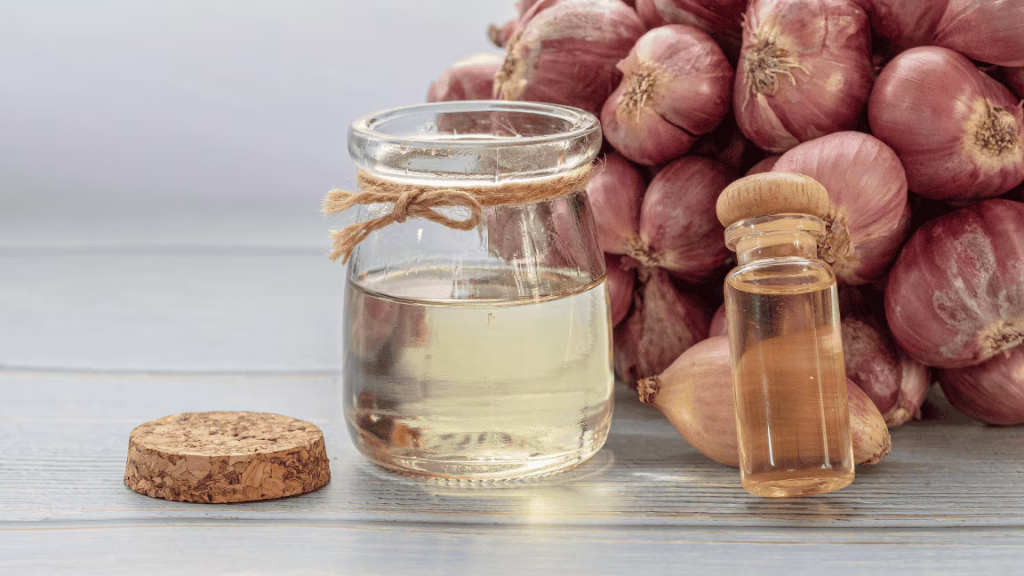Did you know that according to recent surveys, nearly 35% of adults worldwide experience noticeable hair thinning before the age of 40? Hair loss is not just a cosmetic issue—it often affects self-confidence and emotional well-being. While there are countless hair products on the market, many people are turning back to traditional remedies for simple, natural solutions.
On our fanpage, one of the most requested topics is homemade treatments for stronger, thicker hair. Among all the natural remedies, onion oil stands out as one of the most powerful. It has been used for generations in Ayurveda and folk practices to stimulate growth, nourish the scalp, and restore shine.
This article will guide you step by step on how to prepare onion oil at home, explain why it works, and share tips on using it effectively to achieve visible results in just four weeks. Whether you’re struggling with thinning hair, brittle strands, or scalp concerns, onion oil may be the secret you’ve been looking for.

Why Onion Oil for Hair Growth Works
The Science Behind Onion Oil
Onions are rich in sulfur, a mineral that plays a critical role in collagen production. Collagen supports healthy hair follicles, which in turn promotes hair growth. Onion oil also contains antioxidants such as flavonoids and compounds like quercetin that help reduce scalp inflammation and protect hair from oxidative stress.
Benefits of Onion Oil
- Stimulates Hair Growth: By boosting blood circulation in the scalp.
- Strengthens Hair Roots: Sulfur nourishes follicles and reduces breakage.
- Fights Scalp Infections: Its natural antimicrobial properties may help maintain scalp health.
- Delays Premature Graying: Antioxidants help preserve natural pigment.
- Adds Shine and Softness: When blended with carrier oils, it leaves hair nourished and smooth.
Traditional Wisdom Meets Modern Use
In Ayurveda, onion oil has long been massaged into the scalp as part of rejuvenating hair care rituals. Today, beauty enthusiasts are rediscovering this age-old practice with proven results.

How to Make Onion Oil at Home
Making onion oil is simple, cost-effective, and ensures that you know exactly what goes into your hair care product.
Ingredients
- 3 large red onions (rich in sulfur)
- ½ cup coconut oil (or olive oil, as a carrier oil)
- 1 tablespoon castor oil (optional, for thickness)
Instructions
- Peel and chop onions into small pieces.
- Blend into a paste or extract juice.
- Heat coconut oil in a pan on low flame.
- Add onion paste or juice. Stir occasionally for 8–10 minutes.
- Allow mixture to cool and strain using a muslin cloth.
- Store in a glass jar. Keep in a cool, dry place.
Shelf Life
Homemade onion oil can last up to 4 weeks if stored properly. For longer preservation, refrigerate it.

How to Use Onion Oil for Hair Growth
Application Method
- Part your hair into sections.
- Apply a few drops of oil directly to the scalp.
- Massage gently in circular motions for 10–15 minutes.
- Leave for at least 1 hour, or overnight for deeper absorption.
- Wash off with a mild shampoo.
Frequency
- For best results, use 2–3 times per week consistently.
Tips for Better Results
- Mix onion oil with aloe vera gel for soothing effects.
- Combine with rosemary essential oil to further stimulate growth.
- Warm the oil slightly before application to improve absorption.

A 4-Week Onion Oil Challenge
Week 1: Start with scalp massages 2–3 times. You may notice reduced itchiness or dryness.
Week 2: Hair feels softer, shinier, and breakage may decrease.
Week 3: New baby hairs may begin to appear around the hairline.
Week 4: Thicker, fuller strands with visible volume improvement.
Consistency is key. Most users report visible improvements within a month, but long-term use enhances results even more.
Common Myths About Onion Oil
“Onion oil works overnight.”
False. It requires regular application for several weeks to show results.
“It will make your hair smell bad permanently.”
Not true. The smell washes away with shampoo. Adding essential oils also masks it.
“Only red onions work.”
Red onions are richer in sulfur, but white or yellow onions can also be used.
“It damages hair if left overnight.”
No, onion oil is safe to leave overnight, but wash it off in the morning.

Safety and Precautions
- Always perform a patch test before applying to the scalp.
- Avoid if you have onion allergies or extremely sensitive skin.
- Use mild shampoo to wash off oil thoroughly.
- If irritation occurs, discontinue use.
DIY Onion Oil Variations
Onion and Garlic Oil
- Adds extra antimicrobial power for scalp health.
Onion and Curry Leaf Oil
- Traditional Indian recipe believed to slow graying.
Onion and Aloe Vera Blend
- Calms the scalp and reduces any burning sensation.
Onion and Rosemary Oil
- Enhances circulation and speeds up growth.
Real-Life Experiences
Many users on natural beauty forums have shared their stories of successful hair regrowth using onion oil. For example, Sarah, a 32-year-old mother, noticed baby hairs sprouting around her hairline within three weeks of consistent application. Mark, who struggled with thinning hair, reported stronger strands and improved scalp health after two months.
Conclusion
Onion oil is an age-old remedy with modern relevance. Packed with sulfur, antioxidants, and nutrients, it can help support stronger, thicker, and healthier hair. With consistent use and proper preparation, you may see noticeable changes in as little as four weeks.
Sometimes the best solutions are not in expensive bottles, but right in your kitchen.
FAQ
Q1: Can I leave onion oil overnight?
Yes, leaving it overnight enhances absorption, but be sure to wash it out the next morning.
Q2: How long does it take to see results?
Visible results may appear within 4 weeks, but consistency for 8–12 weeks is recommended.
Q3: Can I mix onion oil with other oils?
Yes, coconut, olive, castor, or rosemary oils blend well with onion oil.
Q4: Will it help with dandruff?
Its antimicrobial properties may support scalp health, but results vary.
Q5: Can pregnant women use onion oil?
It’s best to consult a healthcare provider before starting any new treatment during pregnancy.
*Disclaimer: This article is for informational purposes only. It does not provide medical advice, diagnosis, or treatment. Always consult with a qualified healthcare provider before trying homemade remedies or making changes to your hair care routine.




